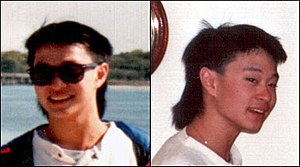Mullet (haircut)
From Wikipedia, the free encyclopedia
| This article needs additional citations for verification. Please help improve this article by adding reliable references (ideally, using inline citations). Unsourced material may be challenged and removed. (August 2007) |
| This article may require cleanup to meet Wikipedia's quality standards. Please improve this article if you can. (September 2007) |
| This article may contain original research or unverified claims. Please improve the article by adding references. See the talk page for details. (November 2008) |
A mullet is a unisex hair style that is short in the front and long in the back. The mullet began making appearances in the popular media in the 1960s and 1970s but did not catch on with the masses until the early 1980s, continuing in vogue among afficionados till the early 1990s. It is enjoying a partial return to favor, partially as a retro look, in the 2000s.
Contents |
[edit] Etymology
It is unclear there is any etymological relation between the mullet as a hairstyle and a slang term for a stupid person popular in the United States since the late 19th century.[1] Conflating the two into one, a mullet wearer and a mullethead, is a product of the 1990s, several decades into the style's popular appearance.
As detailed in the Oxford English Dictionary, the term mullet as derogatory slang for a mullet wearer was "apparently coined, and certainly popularized, by U.S. hip-hop group the Beastie Boys",[2][3] whose 1994 song Mullet Head uses "mullet" and "mullet head" in contemptuous reference to mullet wearers,[4] and whose fan publication, Grand Royal Magazine, featured a reference to the mullet in a 1995 edition as the first published use of the term.[5]
[edit] History
A precursor of the mullet, unrelated to the style explosion in the latter part of the 20th century, first appeared in the early part of the 19th. According to the Notes section of the Viking edition of Lydia Davis's translation of Marcel Proust's Swann's Way, "Jean Baptiste Prosper Bressant was a well-known actor who introduced a new hairstyle, which consisted of wearing the hair in a crew cut in front and longer in the back."
[edit] First popular appearance
The modern mullet began to appear initially in the late 1960s, Welsh pop singer Tom Jones sporting one. Glam rock artist David Bowie wore a proto-mullet in the early 1970s. Florence Henderson, a star of the television sitcom The Brady Bunch featured a mullet in the show's 1973–1974 season opening sequence. The hairstyle achieved further popularity in the late 1970s and 1980s among entertainers with receding hairlines such as Anthony Geary of "Luke and Laura" fame from the soap opera General Hospital, and the pop performers Michael Bolton and Phil Collins.
[edit] 1980s
With its two haircut in one appearance and popularity with a good times set, the mullet was occasionally referred to as having "business in the front and party in the back." Along with many other hairstyles, the trend during the 1980s was towards big and bouffant mullets, wearers often adding spiking or blond highlights. Popular bands such as Guns N' Roses and Mötley Crüe made the mullet quite sucessful. The mullet, especially in combination with a moustache, was popular among German soccer teams and their fans, which used the German expression "VoKuHiLA" (Acronym for Short Front, Long in Neck)[6]. The highpoint of the mullet in the 80ies continental Europe was described as "age of singing tattoed Swedish Flokati Rugs" [7].
[edit] 1990s
In the mid to late 90's the "tail" of the mullet was occasionally "permed" with loose or tight curls adding even more internal composition contrast to the hairstyle.
[edit] 2000s
In the 2000s, the mullet and its associated lifestyle were central themes in movies such as Joe Dirt (2001) and the television show The Mullets (2003-2004).
Despite its negative reputation,[8] the mullet remains a moderately popular hairstyle among certain social groups in various Western countries. In Spain it can be widely identified in the streets of cities like Barcelona.{[9] The Spanish mullet is generally shorter and lighter than a classic mullet, only using the last inch or so of hair above the hairline. It rarely extends beyond the neck. Also in Spain, the mullet is associated with two different ethnic groups: young 2-ply Gypsies and young single ply separatists from the Basque Country.
It is also fairly popular among the 18–34 age group in some East European countries, notably Romania, where it is most popular among high school aged males. In the U.S. and Canada, the mullet is particularly associated with blue collar men, fans of country and heavy metal music, soccer fans and ice hockey players, as well as many lesbians. In the United Kingdom the mullet is most commonly associated with thugs, Pat Sharp or with Central and Eastern Europeans, particularly professional footballers. In Australia the haircut is associated with Bogans and Australian rules football players, particularly those from the 1980s. As well as Lebanese-Australian youths.
In recent years, the mullet has enjoyed resurgent popularity among the hip set, in particular the emo sub-culture, probably due to its association with 1980s retro kitsch.
A popular mullet Website, "mulletsgalore," has been switched off. It was considered to be the vanguard of the mullet identification subculture. The site www.mulletjunky.com [10] has taken its place as the most popular of the "man-on-the-street" mullet identification guide.
[edit] References
- ^ http://www.word-detective.com/052301.html
- ^ http://www.andover.edu/library/courseguides/ay2005/SS/Etymology/mulletoed.pdf
- ^ Entry from OED Online - Series One - Oxford English Dictionary
- ^ http://www.metrolyrics.com/mullet-head-lyrics-beastie-boys.html
- ^ Entry from OED Online - Series One - Oxford English Dictionary
- ^ [1] Hairweb.de Vokuhila / Mullet entry
- ^ [2] Spiegel, 30.11.2008 ZEITMASCHINE INTERNET, So scheußlich waren die Achtziger wirklich (The 80ies really as ugly as they were) Frank Patalong
- ^ "History of the Mullet". http://www.plagueofthemullet.com/History%20of%20The%20Mullet.htm.
- ^ "Party in the Back". http://www.barcelona-metropolitan.com/Article.aspx?TabID=2&MenuID=2&ArticleID=475.
- ^ [http:// www.mulletjunky.com "Mullet Junky"]. http:// www.mulletjunky.com.
[edit] External links
| Look up mullet in Wiktionary, the free dictionary. |


